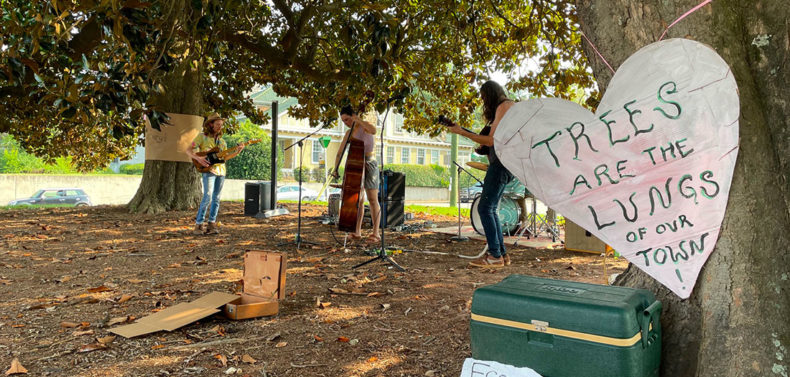Athens loves its trees—after all, we’re the only city in the world that has a tree that owns itself. But now we know just how many trees Athens has.
A recent study by Athens-Clarke County, the Georgia Forestry Commission and the University of Georgia’s Warnell School of Forestry estimated that Athens has 13.5 million trees, with their leaves covering 58% of the city. “This is really good,” Jason Gordon, a UGA forestry professor who helped write the report, told ACC commissioners at a work session in May. “We should be very proud of this.”
Athens’ tree canopy towers over other cities the study looked at for comparison. For example, Tallahassee, FL, has a 55% tree canopy. Atlanta, the “Dogwood City,” is at 48%, and Jacksonville is at 38%. Some cities, like Baltimore, are as low as 20%.
Maintaining that tree canopy will become more challenging as the years go on. Athens has lost most of its older trees over the past 80 years, but overall, the tree canopy has grown. Those trees have been replaced by younger ones—most commonly loblolly pines, sweetgums and water oaks. More than half the local trees are less than six inches in diameter.
However, as those trees age, it will require a different approach to community forestry. “These forests are going to be thinning out as these trees get older,” Gordon said. “With older trees, we have to manage them in different ways. It takes different resources, different knowledge and so forth.”
Gordon recommended replacing those trees as they die with hardier species. Both sweetgums and water oaks are susceptible to wind and ice, and neither hold up very well to nearby construction, he said.
ACC’s tree ordinance, passed in 2006, requires the county to maintain a tree canopy of at least 45%. It sets standards for new developments, but developers usually opt to clear-cut, then plant new trees rather than save those that are already there. Unlike stronger tree ordinances—such as Atlanta’s, where a permit is required to cut down a healthy tree—it offers little protection for existing trees.
Some local residents discovered this last summer, when protesters rallied to save the iconic magnolias outside The Varsity, which is slated for demolition. A petition to save the trees drew more than 11,000 signatures. Atlanta developer Jeff Fuqua told the Athens Banner-Herald earlier this month that his plans for a grocery store and apartments on the site would preserve the trees. There’s nothing in ACC law requiring him to do so, though.
ACC employs a community forester whose job is to care for trees on public property. That’s just a small fraction of Athens’ trees, though—1.7 million, with 11.7 million on private land. Now, county officials want to do more to help private property owners maintain their trees. “Somehow, we need to start engaging private residents on their land, their property, in a strategy to maintain their trees in addition to public trees,” Gordon said.
An updated tree ordinance could include provisions for trees on private property, said Gavin Hassemer, a longtime city planner and interim director of the Central Services Department, where the community forester is housed. “I’m sure that is something that’s on the table,” he told Flagpole. “I’m not going to speak for the [Community Tree Council].”
First, Central Services needs to hire a new forester to replace Rodney Walters, who recently left for a different job. The department is also compiling information related to the tree canopy study on a website for the public to see. Then the Community Tree Council, an appointed advisory board, will decide on a direction and timetable for revising the ordinance, Hassemer said. It would eventually need to be approved by the mayor and commission.
“One major goal or step,” Hassemer said, “is likely to be how we move forward on a communitywide master plan for trees.”
Commissioners already have some ideas about what they’d like to see. Commissioner Melissa Link suggested planting native species that can serve as habitats for native pollinators.
Commissioner Russell Edwards said a homeowner in District 7 recently cut down 53 trees on their property, and that shouldn’t be allowed without a permit. “There has to be some limit,” Edwards said. “Yes, they technically exist on private land, but they have a public benefit.”
The tree canopy study backs him up. Athens’ trees provide more than $32 million of value annually by removing pollution from the air, capturing runoff and providing shade that saves energy. That figure doesn’t include storing carbon that would otherwise contribute to climate change, which is a cumulative effect, Gordon said.
Commissioner Jesse Houle suggested exploring a timber tax to discourage people from cutting down trees, as well as requiring larger trees in new developments. “There’s nothing more depressing than walking around a new development where the trees are barely as tall as you are,” Houle said.
Like what you just read? Support Flagpole by making a donation today. Every dollar you give helps fund our ongoing mission to provide Athens with quality, independent journalism.










